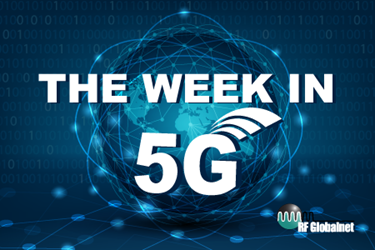The Week in 5G: 2/25/2020 — U.S.' First 5G Healthcare Lab; New 5G Products from Intel, Huawei, and RealMe
By Ed Biller

Huawei’s MatePad Pro 5G — a 10.8-inch 5G tablet announced last year — features a keyboard case and “M-Pencil,” as well as two-way wireless changing and the ability to mirror the screen of a paired smartphone, reports The Verge, noting that the tablet “will ship with open-source Android, without Google’s apps or services.”
Huawei has stated that the 5G tablet will be available in mainland China, as well as markets across the Asia Pacific region, EMEA, and Latin America, in June. The Verge reports 5G models of the tablet start at €799 with 8GB of RAM and 256GB of storage, up to €949 with 8GB of RAM and 512GB.
The Chinese tech giant also boasted of a win on government media last week, announcing it had secured 91 5G commercial contracts worldwide to date, more than any other vendor. Per Yahoo! Finance, more than half of the contracts (47) hail from Europe and 27 are in Asia.
Oppo spinoff RealMe, has announced its 5G-capable X50 Pro, powered by a Qualcomm Snapdragon 865 chipset. Endgadget reports that the X50 Pro “maxes out at 12GB of LPDDR5 RAM with 256GB of UFS 3.0 storage,” and will start from €599 for the 8GB RAM + 128GB storage version, and topping at €749 with 12GB of RAM + 256GB storage.
Taiwan’s HTC also is reportedly set to introduce its first 5G smartphone in 2020, reports Pocket-lint. The article adds that the smartphone represents just one part of the company’s wider 5G strategy, which includes “the use of 5G as part of its virtual reality roadmap, with HTC having revealed its imminent Vive VR headset ambitions in depth last week, alongside more conceptual future plans.”
The HTC 5G Hub (a mobile router first shown at MWC2019) already is available in the UK (through EE).
Sticking in Asia, Thailand’s Advanced Info Service (AIS) has launched its 5G internet service, making AIS the first operator in the country to do so. Per 5Gradar, “AIS 5G is using the 2600-megahertz range it acquired from the country’s spectrum auction held earlier this month and says thousands of its cell sites are compatible with the frequency band.”
In other technology news, Intel has debuted new 5G server and base station chips, as well as a PC network card.
The second-gen Xeon Scalable processor boasts a top speed of 3.9GHz and enhanced AI capabilities, promising “up to 36% more performance than the first-generation version,” reports Venture Beat. The Atom P5900, is touted as the first Intel architecture SoC “for base stations and designed from the ground up for radio access network (RAN) needs,” and features a 10-nanometer chip with hardware-based network acceleration features.
Intel’s eASIC, meanwhile, is touted by the company as its first 5G structured ASIC — “an option for customers seeking custom chip solutions containing low-power, high-performance Intel processors plus customer-specific IP in silicon.” Finally, Intel announced the Ethernet 700 series: 5G-optimized network adapter cards with hardware-enhanced precision time protocol (PTP) “for ultra-low latency and similarly precise timing requirements.”
Corning Inc., for its part, announced that it is working with Qualcomm Technologies, Inc., to develop 5G mmWave infrastructure systems for enterprises and public venues. Business Insider reports that the new product “will combine Qualcomm's 5G RAN platform with Corning tech to enable concurrent beamforming, advanced scheduling, and other features. The product will be geared toward both network operators such as Verizon, Vodafone, and Orange, as well as enterprises potentially looking to build out private networks and infrastructure.”
Samsung Electronics announced a commercial agreement last week with U.S. Cellular for 5G and 4G LTE network solutions. Per a company press release, the agreement “establishes terms under which U.S. Cellular can purchase Samsung’s commercially-proven network solutions, including 5G New Radio (NR) technology, to help U.S. Cellular deliver next-generation service.”
Japanese mobile operator KDDI has inked a deal with Sweden’s Ericsson “for enabling hardware and software solutions to support its standalone 5G offering,” according to a report by Computer Weekly.
Finally, Verizon and Emory Healthcare will officially cut the ribbon this week on what they bill as the nation’s first 5G healthcare lab at the Emory Healthcare Innovation Hub (EHIH) in Atlanta.
